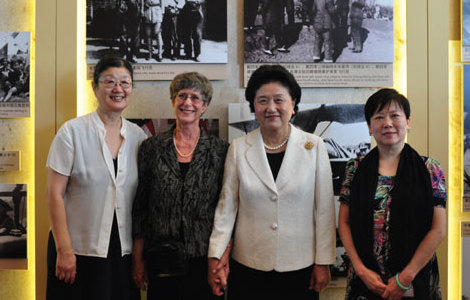Harper apologizes for Chinese Head Tax again
Updated: 2015-06-26 01:09
By LI NA in Toronto(China Daily Canada)
|
||||||||
Canadian Prime Minister Stephen Harper on Monday issued a statement to mark the ninth anniversary of the historic Chinese head tax apology.
"Nine years ago today, I stood in the House of Commons and offered an official apology for the unjust head tax that was imposed on Chinese immigrants to Canada from 1885 to 1923," Harper said.
"The head tax was the product of a profoundly different time, but our Government recognized that it was a grave historical wrong and one that caused undue hardship on families. As I stated nine years ago, ‘this was a grave injustice, and one we are morally obligated to acknowledge’."
In the mid-nineteenth century, more than 15,000 Chinese labourers came to Canada to help build the Canadian Pacific Railway, though they were paid less than half what their co-workers got.
Once the railway was complete in 1885, the government of the day set in place a number of measures to stem the flow of immigrants from China to Canada.
Beginning with the Chinese Immigration Act of 1885, a Head Tax of $50 (roughly the equivalent of $1,200 in today’s money) was imposed on Chinese newcomers. The Government subsequently raised this amount to $100 in 1900 ($2,800 in today’s money), and then to a staggering $500 ($13,500 today) in 1903.
This tax remained in place until 1923, when the government amended the Chinese Immigration Act and effectively banned most Chinese immigrants to Canada until 1947. Newfoundland also imposed a Head Tax on Chinese immigrants from 1906 to 1949, the year Newfoundland joined the confederation.
The Head Tax was legal at the time, as acknowledged by Canadian courts. However, the government of Canada came to accept that the Head Tax was racially-based and inconsistent with the values of modern day Canadians.
"As such, we took responsibility and offered symbolic ex-gratia payments to living Head Tax payers and living spouses of deceased payers. We also established the Community Historical Recognition Program to help finance community projects that explored the impact of past wartime measures and immigration restrictions on cultural and religious communities," Harper said.
On June 22, 2006, on behalf of the Canadian government, the Prime Minister first apologized in the House of Commons for the implementation of the Head Tax.
The Government also announced its intention to offer symbolic individual payments of $20,000 to living Chinese Head Tax payers and living spouses of deceased payers.
"These actions helped to heal old wounds and demonstrated that our government is committed to acknowledging historical wrongs and to moving forward, together, to build a stronger Canada," Harper explained.
Canada is establishing a $24 million community historical recognition program to provide grant and contribution funding for community projects linked to wartime measures and immigration restrictions and a $10 million national historical recognition program to fund federal initiatives, developed in partnership with other stakeholders.
"As we approach the 150th anniversary of Confederation, it is important to recognize the invaluable contributions Chinese-Canadians have made, and continue to make, to the building of our great nation," Harper said.
renali@chinadailyusa.com
Most Viewed
Editor's Picks

|

|

|

|

|

|
Today's Top News
China opposes US
defense bill
Key events in the history of
US gay rights
More people around world like China, survey finds
Victims of Charleston
massacre mourned
US police fatally shoot unarmed black man in domestic dispute
No rest until sweeping victory against drugs, President Xi says
Pundits cheer China-US talks
US Supreme Court upholds key Obamacare insurance subsidies
US Weekly

|

|














